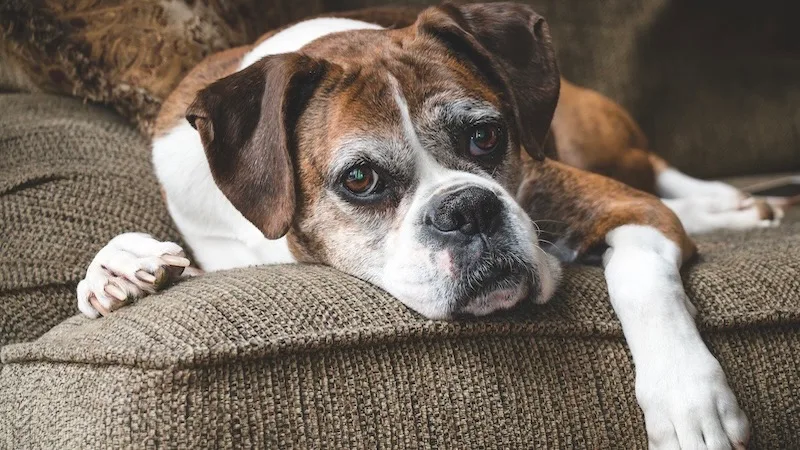How to Tell If Your Senior Dog Is Depressed
Lethargy and loss of appetite are also common signs of depression in animals, so how can you tell if your pet is simply aging or if it's anxiety or depression?

As pets age, they slow down. The changes related to age may seem sudden or may happen gradually over time, but either way, it’s normal to expect your elderly pet to be more lethargic and even eat less. Lethargy and loss of appetite are also common signs of depression in animals, so how can you tell if your pet is simply aging or if it's indicative of anxiety or depression? With so many cross-over or similar symptoms, what steps do you need to take to provide the medical and emotional care for your aging pet?
Symptoms of Depression in Pets that Are Similar to Signs of Aging
Just like humans, our beloved pets can experience physical and emotional challenges as they age. Because mood changes and physical slow down can happen in tandem, it may be difficult to identify your pet’s emotional well-being when you’re worried about their physical changes. There are many symptoms of depression and ageing that are similar, so it’s important to know the causes of both so you can speak to your vet about them during your holistic wellness checkup.
Fatigue
Similar to humans, depressed dogs may lose the desire to run and play and will instead spend more time sleeping or lying around. However, this is not a sign only of depression, because as dogs reach their senior years, their energy levels drop. There is no way to predict when your dog will start to show this sign of age because it varies by size, breed, and lifestyle, so knowing your dog's individual personality and lifestyle is critical to monitoring their health.
Loss of Appetite
As dogs age and their metabolism slows, their appetite will likely begin to diminish. Along with the lower energy, they will need less food to get through their days. This loss of appetite should not greatly reduce your dog’s weight though. However, if the lack of appetite is related to depression, there’s a good chance they will not be getting enough food to fuel them, and sudden weight loss may be present. If you notice dramatic weight loss, talk to your vet because it could be a sign that something more serious is going on than simple aging.
Increase in Accidents
Incontinence in aging dogs is common, though usually not until they are at an advanced age. However, it is also a sign of depression in dogs. If your normally well-trained dog is suddenly having accidents in the house or off their schedule, there may be more at stake. Talking to a vet is a good idea, but don’t forget to bring a stool sample to your appointment.
Lack of Interest in Their Favorite Activities
Does your dog love their evening walk or daily play time? It may seem like a given that they will always love those activities, but that love may fall by the wayside as they age or if they are depressed. This is often one of the first signs of any number or issues your dog is experiencing, so if you notice changes in their interests and exuberance, take a look at the other aspects of their life to see if you need to get a vet involved.
How Can You Tell If Your Dog Is Depressed?
If you notice that your dog has shown signs of depression, analyze their current lifestyle. Was it progressive, or did they appear suddenly? A sudden change in behavior or personality may be a sign that it is more related to depression than age.
Has your dog experienced any recent changes in lifestyle? A family move or other stressors may cause a temporary bout of depression in dogs. Has your dog experienced a loss? Dogs get depressed when they lose a loved one, whether that’s a fellow animal companion or human caretaker. Give your pup time to mourn, but get a vet involved if they don’t seem to be coming out of their depression.
What to Do If Your Dog Is Depressed
If you’ve determined that your dog is indeed depressed, talk to your vet about the best course of action for your dog’s specific needs. They may recommend medication, changes in food, or even more social interaction. If your dog is lonely or bored, activities to help with separation anxiety could bring them out of their slump.
The best way to help your dog is to know their personality and behaviors. The various courses of their lives will cause them to grow and change. Recognizing when something is different or wrong, even if it is subtle, and reporting that to your vet is the best way to keep your pup happy and healthy through all stages of their life.
Accident & Illness plans through AKC Pet Insurance (underwritten by Independence American Insurance Company) can help provide coverage for behavioral issues like anxiety and compulsive behavior. Get a quote today and help give your pet the gift of a happy and healthy future.
CJ has always wanted to be a writer. She even threatened to drop out after her first day of kindergarten when they weren’t immediately going to teach her to read and write. Fortunately, she stayed in school, earned her degree in Creative Writing from Christopher Newport University, and now gets to live her best life with her husband, 3 Japanese Chins, and cat writing for AKC Pet Insurance.
READ MORE ARTICLES